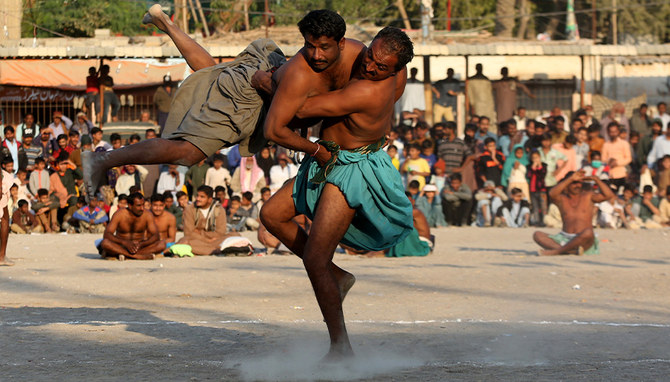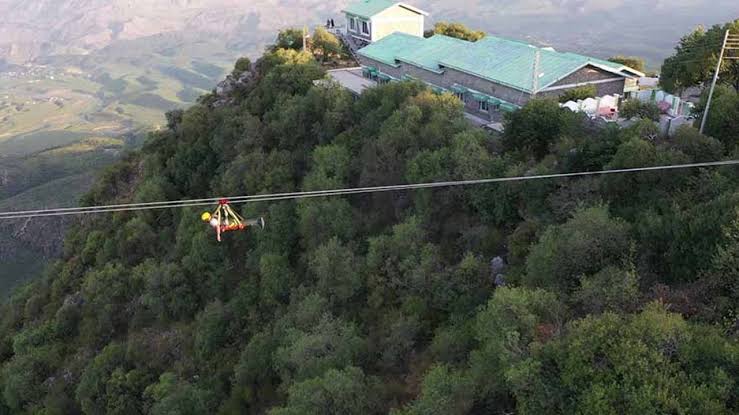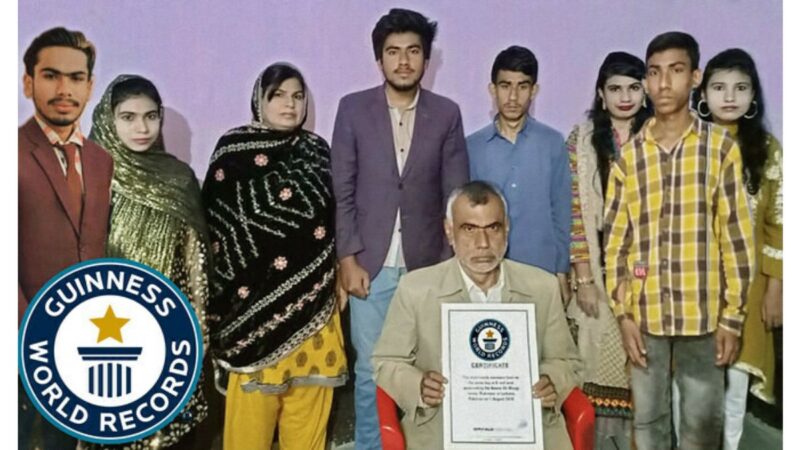Welcome to the vibrant world of Pakistani sports, where passion, creativity, and a touch of the unexpected come together to give birth to some of the most bizarre and unique sporting events. Nestled within the rich tapestry of Pakistan’s diverse culture and traditions, these sports defy convention and redefine what it means to compete and celebrate.
From ancient traditions passed down through generations to modern innovations that have captured the nation’s imagination, join us as we dive into the extraordinary realm of five bizarre sports played in Pakistan. Get ready to witness the astonishing blend of skill, enthusiasm, and a hint of eccentricity that make these sports truly one-of-a-kind.
READ ALSO: 17 FAST AND EFFICIENT CARS LOVED BY PAKISTANIS IN 2023
1. Watee or Gutti:
*Strength Test *One Person *Health Risk
Watee or Gutti Lifting is a traditional sport in pakistan that is centuries old. This type of weight lifting competition is well known in the Potohar Region and consist of athletes of different weight classes proving their manhood and lifting the heaviest stone for reps.
One of the origins of this type of stonelifting comes from wedding ceremonies in the region where the grooms side would have to get a 80kg stone over their shoulder. Failure would delay the wedding until somebody could.
Competitions are always lively with drummers playing rhythmic music to hype up the crowd and the competitors. There are strict rules in competition, athletes are not allowed to use their thumbs to lift the weight and no part of the body other than ones hands is allowed to touch the stone. That only adds to how impressive these feats of strength are.
Athletes have to specialize in this and practice daily at their sport. The eat diets consisting of large amounts of meat and dairy. Unfortunately due to lack of resources in the are this sport is in danger of dying out as the cost of food is too high to grow the sport and there is a lack of state sponsored national competition.
2. Malakhra
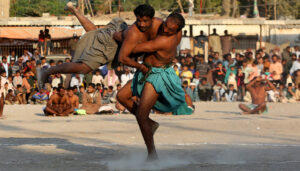
*Strength Test *One-on-one Combat *Traditional Sports
This traditional combat sport, known as Malakhra or Malakhro, traces its origins back to ancient times and is primarily practiced in the regions of Sindh, Pakistan. In this captivating contest, two competitors engage in a showdown where the objective is to topple the opponent to the ground by skillfully employing the waistcloth that encircles their bodies. Commencing with a gripping grasp of each other’s waistcloths, the duel concludes when one wrestler successfully executes a throw, asserting dominance over their adversary.
Holding the esteemed status of being Sindh’s provincial sport, Malakhra garners an impressive following, attracting enthusiasts from near and far to witness celebrated wrestlers, or “malhoos,” clash amid the muddy arena. Acknowledging its widespread appeal, matches for this iconic traditional pursuit frequently coincide with Fridays or public holidays, facilitating broader spectator engagement. The sport also takes center stage during local festivals and fairs, adding to its allure. Aspiring participants in this fierce discipline undergo years of intense physical training and adhere to strict dietary regimes, essential prerequisites for mastering the art that demands a fusion of robust physicality and strategic acumen.
Notably, in 2009, the Institute of Sindhology at the University of Sindh in Jamshoro gained attention for its pioneering initiative—an exclusive “Malakhro corner” within its museum. This institution, true to its name, is dedicated to safeguarding and promoting the distinctive cultural, literary, and historical heritage of Sindh.
3. Slap Kabaddi
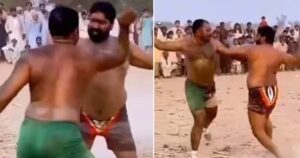
*Direct Contact *One-on-one combat *Relatively new
Slap Kabaddi is a one-on-one sport in which competitors compete against one another in a circular arena while dressed traditionally. The goal is to slap the opponent as hard and frequently as you can while defending yourself from or deflecting slaps from the opposite side. Punches are deemed fouls and can get you kicked out of the game. The game continues until either one of the competitors quits or the referee identifies a winner using the points accrued through hitting and erasing.
The origin of Slap Kabaddi is not clear. However, Slap Kabaddi has its own rules and style, which make it distinct and unique.
Slap Kabaddi is more enjoyable and humorous, in the opinion of Pakistani player Haji Tassawur than traditional kabaddi. According to him, viewers of Slap Kabaddi prefer it over the traditional version because they find the slapping amusing and enjoy rooting for their favourite players.
4. Yakk Polo
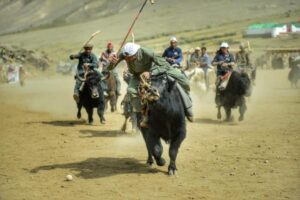
*Muscular Strength *Team Play *Traditional Sports
Yak Polo, traditional game of Shimshal Hunza is one of the traditional games that is played in Shimshal Hunza and this game gives joy and thrill to the players and even the spectators.
Yak polo is a sport that was directly derived from polo, in which yaks are used instead of horses. The sport originated in Mongolia in the early 21st century as a form of tourist attraction, which later gained a lot of attention.
There is an interesting story behind this game and according to local historians, a man named “Sher” who was the son of Mamu Singh, the first man who discovered Shimshal Hunza, played a Polo match against the Chinese Army to win a part of Shimshal pass which connects with China.
The Chinese Army had horses to play but Mr. Sher had no Horse so he played Polo on Yak and fortunately he won the polo match against the Chinese Army. Mr. Sher also won a part of land near the Shimshal pass for the people of Shimshal Hunza.
In the remembrance of that historical achievement by Sher, people of Shimshal Hunza celebrate Yak Mela every year. This event is celebrated for two days where different teams participate with their Yaks to win the “Sher Trophy.”
Yak polo is a team sport, played between two five-player teams. One player from each team is designated as the goal keeper. Since yaks are much slower than horses, the field size used in smaller than what is used for polo. There is a small region marked at both ends of the field which serves as the goal line. All players carry a polo stick, and a polo ball is used to play.
The objective of the sport is to score as many goals as possible. The gameplay is exactly same as polo, where teams move the ball towards the goal line by striking it with the sticks. The duration of a match varies and is decided before the start of the match by both teams. The team with the most goals at the end of the match is the winner.
Under the local traditions, musicians, who are called Ustads, play music with sarnai and drums to encourage and energise the players.
In polo, as the horse runs faster, it is easier to take it closer to the ball and control it, but yak runs slower and manoeuvring is also difficult so reaching the ball and hitting it is much more difficult. Scoring a goal in yak polo is a very difficult task and only the expert riders having experience of yak riding can handle the situation.
5. Mukha
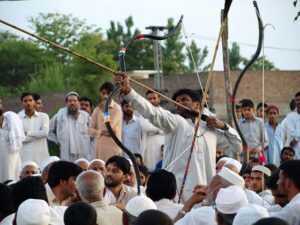
*Strength and Precision *Team Play *Traditional Sports
Mukha can be described as a distant cousin of archery. This 150-year-old traditional sport is very popular in Khyber-Pakhtunkhwa, particularly in Mardan and Swabi districts. The locals in these areas organize summer festivals where they gather in droves to see the Mukha matches between these districts.
At first glance, this sport may look exactly like archery. However, Mukha is played with long rods made of stag horns called ‘ghashay’ and large bows known as ‘leenda’. The rods, which are essentially used as arrows, have metallic saucer-shaped tips that help them hit the targets set around 35 feet away at a height of about 12 feet.
The targets are usually made of white wood and are referred to as ‘takai.’ They are surrounded by a circular ring called ‘kwaara’ and placed in fresh clay.
If the player manages to strike the targets they score a point. A successful attempt is usually celebrated by beating loud drums. On the other hand, if the player misses the target, the opposing team would celebrate instead.
Each team competing in Mukha requires 10 players in total. The team is led by a captain who is called ‘mashar’ and a vice-captain known as ‘wazir’. The rest of the players are referred to as ‘mukhwals’.
Much like other outdoor games in Pakistan, Mukha also requires a lot of strength, patience and precision.

Inflics provides it readers the information that they need in concise and short articles, making information and news more accessible to everyone.

